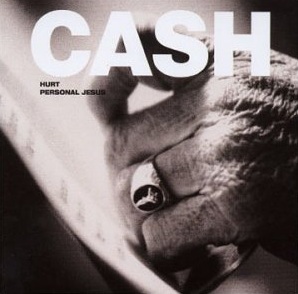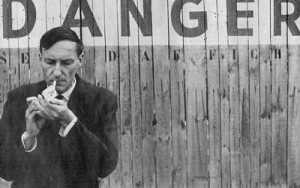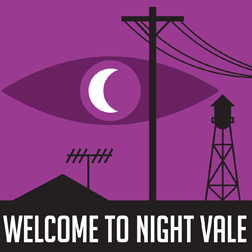The number one comment I get from people when they see me handwriting large blocks of text is, “I could never do that! My arm would fall off!” Basically, they’re afraid of pain.
Wimps.
Like any physical skill, you have to practice, you have to prep, and you have to use an appropriate technique. Let me give you my A+ Rule #1 for avoiding 99.94% of all handwriting problems.
Slow the fuck down.
If you’re writing too fast, you’re scribbling and you’re going to tense up. You’re going to hold your pen too hard, you’re going to curl up over your notebook like a gargoyle with osteoporosis, and your handwriting will look like a Jackson Pollock painting. Slow your roll.
“But wait,” you cry in existential angst. “I can’t possibly write as fast as the thoughts come! I’ll lose words!” To which I reply, “So what?”
Your words will wait. The stampede of your words will circle back to stampede in front of you all over again. Some may escape, never to be seen again, but they’ll be replaced with other words. Better words. You’ll never be able to write, or type, or dictate as fast as thought. Stop thinking of it as a footrace—when it’s really a flirtation.
My final word about pain is this: if any part of this hurts, you’re doing it wrong. You need to figure out what it is and change your technique. You might need to take a break, or sit in a different chair, or adjust the height or angle of your desk, or try a different pen, or even just get up and take a nice jog in the park for a while.
You can sit or stand, doesn’t matter, as long as your back is straight and you’re comfortable. Do not hunch over your notebook like a dragon guarding his hoard. Sit up tall, feet on the ground or a footrest [0]. Office chairs are office chairs for a reason—they’re designed to support you for long-term sitting. But you can still use the dining room table, the couch, the comfy chair, or even in bed, as long as you can sit up fairly straight. Prop yourself up with pillows if you have to [1].
You will need a hard surface, or at least a hard backed notebook. If you’re at a desk or table, that’s great. Otherwise, I recommend heading down to the craft store and picking up a good-sized lap desk, the kind where the pillow is a bean bag. They’re not terribly expensive and they add a lot of flexibility to your work space. I like the larger ones so my notebook doesn’t hang too much over the edge.
For that matter, if you are using a desk/table/kitchen counter, clear that sucker off. Give yourself some room to spread out; you might find you’re more comfortable with your notebook farther away rather than stabbing you in the chest.
A hundred years ago, professional copyists used a slanted desk for writing all day in relative comfort. I would personally love to have an adjustable drafting table, but unless I can find a nice one in the dumpster, it’s not going to happen. Some modern handwriting coaches recommend using a tabletop slant board. You can spend a couple of hundred to buy a nice one, DIY an ugly one for cheap, or shake all the beans in your lap desk to one side and plop it down on your tabletop.
If your hand is cramping up, you’re probably holding your pen too tightly. If this is a habit, you may have to consciously retrain your grip, but it could also be that you’re using the wrong pen shape— too fat, too skinny, too heavy, too light, too cushiony, not cushiony enough…
Another mistake leading to hand cramps is making your fingers do all the work. Your fingers are controlled by little muscles in your hand and forearm, which are great for precise movements but tire very easily. You want to use the larger muscles in your arm and shoulder to put your hand in the right position, and then your fingers form each letter. If the muscles in your shoulders and arms are tense, you’ll lose comfort and legibility.
Take regular breaks to rest, roll your wrists and hands, stretch out your nick, and generally change position, particularly when you’re just starting out. You’ll need to get into condition before beginning any marathon writing sessions.
I don’t know anybody who actually likes their handwriting. That’s because most of us try to write too fast and just scribble. I’ve noticed that a person with very neat handwriting takes the time to carefully draw each letter. Writing slowly and beautifully is a habit they’ve developed over their lifetime.
Some people bemoan cursive as a dying art. I call bullshit. Cursive is supposed to be faster and neater, but it drives me nuts— there’s all those extra loops and backtracing. Today’s standard is more of a half-joined up print where you join letters when it makes sense and lift your pen otherwise.
You can download all sorts of handwriting practice sheets aimed at homeschoolers, but I would avoid these. They’re boring. Instead, remember Rule #1, and practice on things like grocery lists.
At some point you are going to want to input your writing into a computer. At first blush, this seems to be a dull time waster. However, this is actually a great opportunity to give your manuscript a close reading. Once you’ve typed it in, it’s easy to rearrange sentences and paragraphs and adjust your word choices. Typing is a chance to write a second, and usually vastly improved, draft.
A typing stand, or a copyholder, is a must. Typing stands, which hold your notebook up at an angle where you can see it, used to be standard office equipment, but they’re harder to find now. A cat destroyed mine, but I discovered that a small tabletop easel that I bought at a craft store for another project works just great.
Basically, try a bunch of stuff out until you find out what works. And happy handwriting!
[0] Especially for short people. You can fake a footrest out of a couch cushion in an emergency, but my favorite inexpensive expedient is to duct-tape a stack of phone books or newspapers together.
[1] Assuming you haven’t already used the pillows to build a blanket fort, which would be a cool writing space.



